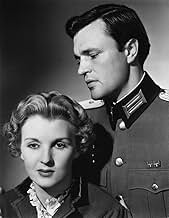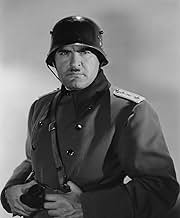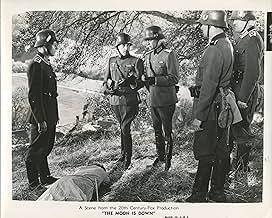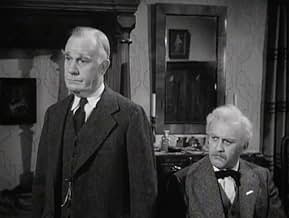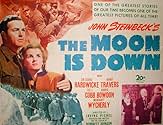CALIFICACIÓN DE IMDb
7.0/10
610
TU CALIFICACIÓN
Durante la ocupación nazi de Noruega, un pequeño pueblo noruego lucha por hacer frente a los invasores y algunos lugareños optan por la colaboración, mientras que otros prefieren la resisten... Leer todoDurante la ocupación nazi de Noruega, un pequeño pueblo noruego lucha por hacer frente a los invasores y algunos lugareños optan por la colaboración, mientras que otros prefieren la resistencia armada.Durante la ocupación nazi de Noruega, un pequeño pueblo noruego lucha por hacer frente a los invasores y algunos lugareños optan por la colaboración, mientras que otros prefieren la resistencia armada.
- Dirección
- Guionistas
- Elenco
- Premios
- 6 premios ganados en total
Cedric Hardwicke
- Col. Lanser
- (as Sir Cedric Hardwicke)
Frederic Brunn
- German Soldier
- (as Frederick Brunn)
Ernst Deutsch
- Maj. Hunter
- (as Ernest Dorian)
Ludwig Donath
- Hitler's Voice
- (as Louis Donath)
Richard Abbott
- Villager
- (sin créditos)
Louis V. Arco
- Schumann
- (sin créditos)
Georgia Backus
- Villager
- (sin créditos)
John Banner
- Lt. Prackle
- (sin créditos)
Trevor Bardette
- Knute Pierson - Foreman
- (sin créditos)
- Dirección
- Guionistas
- Todo el elenco y el equipo
- Producción, taquilla y más en IMDbPro
Opiniones destacadas
"Haven't we some little right to life?"
To that question by one of the characters in the Nazi-conquered Norwegian town, actually, no, not when governments say "Fight. Destroy. Kill."
When governments say "You must have a number" and "You must carry this card embossed with that number" or "You must wear this uniform" and "You must kill that other human being," you are being considered as property, and that means you no longer have rights.
At least that is how governments want you to believe.
You are expected to obey, not think. Obey, not have desires of your own. You are a cog in the great machinery of the state.
"The Moon Is Down" was intended specifically as anti-Nazi propaganda, coming as it did shortly after the United States entered World War II, but there is a deeper and more universal meaning.
Even Nazis, or at least German soldiers lured or forced into war by German leaders of the National Socialist German Workers Party, or Nazis, have some vestiges of humanity -- at least some of them.
Told their lives belong to the state, to the fatherland, and that they must act, even die, for purposes of the Master Race, and not to think of or for themselves, still sometimes selfish desires rise to the fore, and such basics as love or freedom motivate more than do orders.
Death and destruction are inevitable results of the subordination of individuals and individuality to the state, to the society, to the race.
Humanity's bloodiest century, the twentieth, proved the truth of that statement with the rise of Nazism and Communism, both of which demanded the submersion of individuals into the mass.
When individual humans no longer matter, mass murders become mere matters of strategy, or "the continuation of politics by other means," as von Clausewitz is quoted.
Few movies illustrate the horror and degradation of war and governments better than "The Moon Is Down," which was presented on Turner Classic Movies the night of 2 January 2017. I had read the John Steinbeck book decades ago and not appreciated that message, not even seen it, that early in my life.
Now, though, after long years lived with the threat of war or some act of tyranny hanging over me nearly every day of that time, I do appreciate the tale and its moral, or at least the moral I now see.
Steinbeck wrote this, a good summation of the meaning of "The Moon Is Down": "Free men cannot start a war, but once it is started, they can fight on in defeat. Herd men, followers of a leader, cannot do that, and so it is always the herd men who win battles and the free men who win wars."
We are engaged on a daily basis in an ongoing war of individualism versus a leader, versus the mob, versus the collective, versus the state, or, especially these last few decades, versus a murderous and destructive movement some try to call a religion.
I would like to recommend "The Moon Is Down" in both book and movie form, not for entertainment, since there is no joy or pleasure in either, but for the object lesson: Do not let politicians and governments control your life.
To that question by one of the characters in the Nazi-conquered Norwegian town, actually, no, not when governments say "Fight. Destroy. Kill."
When governments say "You must have a number" and "You must carry this card embossed with that number" or "You must wear this uniform" and "You must kill that other human being," you are being considered as property, and that means you no longer have rights.
At least that is how governments want you to believe.
You are expected to obey, not think. Obey, not have desires of your own. You are a cog in the great machinery of the state.
"The Moon Is Down" was intended specifically as anti-Nazi propaganda, coming as it did shortly after the United States entered World War II, but there is a deeper and more universal meaning.
Even Nazis, or at least German soldiers lured or forced into war by German leaders of the National Socialist German Workers Party, or Nazis, have some vestiges of humanity -- at least some of them.
Told their lives belong to the state, to the fatherland, and that they must act, even die, for purposes of the Master Race, and not to think of or for themselves, still sometimes selfish desires rise to the fore, and such basics as love or freedom motivate more than do orders.
Death and destruction are inevitable results of the subordination of individuals and individuality to the state, to the society, to the race.
Humanity's bloodiest century, the twentieth, proved the truth of that statement with the rise of Nazism and Communism, both of which demanded the submersion of individuals into the mass.
When individual humans no longer matter, mass murders become mere matters of strategy, or "the continuation of politics by other means," as von Clausewitz is quoted.
Few movies illustrate the horror and degradation of war and governments better than "The Moon Is Down," which was presented on Turner Classic Movies the night of 2 January 2017. I had read the John Steinbeck book decades ago and not appreciated that message, not even seen it, that early in my life.
Now, though, after long years lived with the threat of war or some act of tyranny hanging over me nearly every day of that time, I do appreciate the tale and its moral, or at least the moral I now see.
Steinbeck wrote this, a good summation of the meaning of "The Moon Is Down": "Free men cannot start a war, but once it is started, they can fight on in defeat. Herd men, followers of a leader, cannot do that, and so it is always the herd men who win battles and the free men who win wars."
We are engaged on a daily basis in an ongoing war of individualism versus a leader, versus the mob, versus the collective, versus the state, or, especially these last few decades, versus a murderous and destructive movement some try to call a religion.
I would like to recommend "The Moon Is Down" in both book and movie form, not for entertainment, since there is no joy or pleasure in either, but for the object lesson: Do not let politicians and governments control your life.
There were several films made during the uncertainty of WWII that focused on European resistance, to boost up morale and show the frightened Americans in the audience that if we all pulled together and resisted, we would lick the Germans. My all-time favorite is Edge of Darkness, but if you've already seen that one and are looking for more in that same subgenre, check out The Moon Is Down. It's a little on the obscure side, with Cedric Hardwicke getting top billing, Henry Travers getting second, and Lee J. Cobb taking third, but it's still a good drama. You'll have to cut it slack for not having the budget of an A-tier picture, but if it did and could have afforded Walter Huston or Monty Woolley, it might have been remembered today.
Surprisingly gritty for 1943, this war drama has many dark moments. When one group of rebels gets the firing squad, they sing "A Mighty Fortress Is Our God" until they are killed, at which time the crowd of townspeople take over. In another scene, Henry Travers gives a condemned man a pep talk before his death, telling him that the men who kill him will never have another moment's peace. Henry delivers the lines just like he would have as Clarence the Angel, but you can see through that the script and intent were good.
Only rent this one if you're in the mood for something heavy. At that point in the war, we didn't know which side was going to win, and most of the war movies were pretty grim. You could tell we were frightened, a feeling many post-war movies weren't able to capture since the outcome was already known.
Surprisingly gritty for 1943, this war drama has many dark moments. When one group of rebels gets the firing squad, they sing "A Mighty Fortress Is Our God" until they are killed, at which time the crowd of townspeople take over. In another scene, Henry Travers gives a condemned man a pep talk before his death, telling him that the men who kill him will never have another moment's peace. Henry delivers the lines just like he would have as Clarence the Angel, but you can see through that the script and intent were good.
Only rent this one if you're in the mood for something heavy. At that point in the war, we didn't know which side was going to win, and most of the war movies were pretty grim. You could tell we were frightened, a feeling many post-war movies weren't able to capture since the outcome was already known.
This movie has no big-box office stars, nor a major director. Yet it tells its story effectively and, sometimes, in a deeply moving fashion, because the script is good and the actors, accustomed to playing character roles, make real individuals out of their assignments.
The movie starts off by establishing several points: 1) Norway fell fast to the Germans not because they were weak or pro-Nazi, but because they were betrayed from the inside by fifth columnists (Quislings), a fear that runs through several wartime U.S. movies (Keeper of the Flame is perhaps the best of those.) 2) The Norwegians are decent people, and therefore worth helping. The town's militia refuse to shoot at the German paratroopers as they are falling through the sky because "you're not supposed to do that," even though the Germans promptly slaughter the militia from hidden positions.
This could be compared to American movie presentations of the fall of France, in which the French are not portrayed as having been betrayed from the inside - though in fact they were, to an extent, by Pétain. That may, at least in part, be because the American government maintained diplomatic relations of a sort with the Vichy government until the Germans finally invaded formerly "Free France" in the hope of winning them over, with the result that Pétain could not be portrayed as the traitor he really was.
This is a fine movie, worth watching.
The movie starts off by establishing several points: 1) Norway fell fast to the Germans not because they were weak or pro-Nazi, but because they were betrayed from the inside by fifth columnists (Quislings), a fear that runs through several wartime U.S. movies (Keeper of the Flame is perhaps the best of those.) 2) The Norwegians are decent people, and therefore worth helping. The town's militia refuse to shoot at the German paratroopers as they are falling through the sky because "you're not supposed to do that," even though the Germans promptly slaughter the militia from hidden positions.
This could be compared to American movie presentations of the fall of France, in which the French are not portrayed as having been betrayed from the inside - though in fact they were, to an extent, by Pétain. That may, at least in part, be because the American government maintained diplomatic relations of a sort with the Vichy government until the Germans finally invaded formerly "Free France" in the hope of winning them over, with the result that Pétain could not be portrayed as the traitor he really was.
This is a fine movie, worth watching.
...based on a novel by John Steinbeck, and directed by Irving Pichel. German forces occupy a small Norwegian village. The coolly pragmatic German leader Col. Lanser (Cedric Hardwicke) tries to set up the occupation with strict efficiency. However, various townsfolk begin to rise up, first in small ways, eventually getting deadlier, leading to misery on both sides. Also featuring Natalie Wood in her debut, but I'll get back to that later.
Having already watched Hangmen Also Die, Hitler's Madman, Commandos Strike at Dawn, and Edge of Darkness, all from 1943, this material is well-worn for me. However, I still managed to enjoy this more dialogue-heavy look at the familiar scenario. Hardwicke is very good as the German officer in charge, more interested in being a quietly effective administrator than a cruel dictator. Henry Travers is excellent as the wise town mayor. Peter van Eyck, who appeared as a German soldier in 6 1943 releases, is moving as a sympathetic soldier. For some reason the filmmakers have 31-year-old Lee J. Cobb playing an old guy in white wig and makeup...there were no actual older actors available? Dorris Bowden, the ostensible female lead, is very uneven as an angry widow. She has some good moments, and others that seem amateurish, but since she was married to producer-screenwriter Nunnally Johnson at the time, she got the part.
Natalie Wood's appearance is a bit problematic. Although uncredited, she's very visible in her one scene, and I thought it was her before I even knew she was supposed to be in the film. Some sources have this listed as Wood's debut while still others say it is not Natalie Wood at all. Regardless, the film is enjoyable, and the ending is very memorable.
Having already watched Hangmen Also Die, Hitler's Madman, Commandos Strike at Dawn, and Edge of Darkness, all from 1943, this material is well-worn for me. However, I still managed to enjoy this more dialogue-heavy look at the familiar scenario. Hardwicke is very good as the German officer in charge, more interested in being a quietly effective administrator than a cruel dictator. Henry Travers is excellent as the wise town mayor. Peter van Eyck, who appeared as a German soldier in 6 1943 releases, is moving as a sympathetic soldier. For some reason the filmmakers have 31-year-old Lee J. Cobb playing an old guy in white wig and makeup...there were no actual older actors available? Dorris Bowden, the ostensible female lead, is very uneven as an angry widow. She has some good moments, and others that seem amateurish, but since she was married to producer-screenwriter Nunnally Johnson at the time, she got the part.
Natalie Wood's appearance is a bit problematic. Although uncredited, she's very visible in her one scene, and I thought it was her before I even knew she was supposed to be in the film. Some sources have this listed as Wood's debut while still others say it is not Natalie Wood at all. Regardless, the film is enjoyable, and the ending is very memorable.
This movie is based on one of John Steinbeck's lesser-known novels. I have a feeling that Steinbeck wrote the novel for much the same reason that the movie was made: Propaganda in support of the War.
Nunnally Johnson wrote the play for the movie, based on Steinbeck's novel, just as he had written the screenplay for Steinbeck's The Grapes of Wrath (1940). Nunnaly's wife, Dorris Bodon, had an acting role of both of these movies. The movie's director, Irving Pichel, had a small unaccredited role, here, as the Inn Keeper. Natalie Wood made her first screen appearance in this movie and then went on to make her 2nd, 3rd and 4th movie appearances in Irving Pichel-directed movies: Happy Land (1943), Tomorrow Is Forever, (1943), and The Bride Wore Boots (1946).
This movie is not so much star-oriented as it is character–oriented, with great character actors taking on the main roles. Cedric Hardwick plays Col Lanser, the coy and pragmatic Nazi officer who is assigned to take over a small Norwegian mining village for it rich iron mines. After the German victory, the village historian, Dr. Winter (Lee J. Cobb), acerbically jokes with its mayor, Orden (Henry Travers), that the German victory only took 4 hours and the victory was announced before anyone know there was even a battle.
The "victory" takes place as hundreds of German paratroopers are dropped into the small village while its tiny militia is enjoying a picnic and shooting contest in the country. The picnic had been arranged by the local store keeper, George Corell (E.J. Ballantine), with the hope that he will be quickly advanced up the German ranks and sent to Berlin.
When Col Lanser interviews Dr. Winter, the mayor, and his wife, Sarah (Margaret Wycherly), they are outraged by Corell's treachery. When Lanser tells Orden that the miners must work harder to supply iron for Germany, Odren tells him that Germans do not understand the people they conquer--they never have, and they never will. Free people do not take orders from a dictator, they live to be free and their freedom is build around an idea—not an order from a dictator. Just as Odren says, the people of the village are not easily pushed around. It is easier to conquer a country in battle than it is to occupy it by telling its free people what they MUST do to stay alive.
The movie demonstrates this and it also has scenes that demonstrate that soldiers are trained to fight and win territory–not to manage the people they have vanquished. Not only do the Norwegians slow down their work in the mines, they also commit acts of sabotage on those mines, and engage in other acts of resistance against the Germans who occupy them. This only increases as the RAF drops parachuted packets of dynamite to help them with these many "small" acts of resistance such as blowing up bridges and roads and other means of production and distribution of the mined iron that is to be used by Nazis in their war.
In the end, the German soldiers grow tired of being hated by the locals and guarding against their acts of resistance rather than fighting wars. This is demonstrated when one soldier, Lt. Tonder (Peter van Eyck), tries to just enjoy the simple company of one Norwegian woman, Molly Morden (Dorris Bowdon). Though she is lonely and is very hungry— food is being withheld from the families in order to feed the soldiers and iron miners—she remembers that Tonder was responsible for killing her husband. So, she stabs Tonder to death with a pair of scissors then manages to escape to Sweden.
In the end, "the flies conquer the flypaper."
Nunnally Johnson wrote the play for the movie, based on Steinbeck's novel, just as he had written the screenplay for Steinbeck's The Grapes of Wrath (1940). Nunnaly's wife, Dorris Bodon, had an acting role of both of these movies. The movie's director, Irving Pichel, had a small unaccredited role, here, as the Inn Keeper. Natalie Wood made her first screen appearance in this movie and then went on to make her 2nd, 3rd and 4th movie appearances in Irving Pichel-directed movies: Happy Land (1943), Tomorrow Is Forever, (1943), and The Bride Wore Boots (1946).
This movie is not so much star-oriented as it is character–oriented, with great character actors taking on the main roles. Cedric Hardwick plays Col Lanser, the coy and pragmatic Nazi officer who is assigned to take over a small Norwegian mining village for it rich iron mines. After the German victory, the village historian, Dr. Winter (Lee J. Cobb), acerbically jokes with its mayor, Orden (Henry Travers), that the German victory only took 4 hours and the victory was announced before anyone know there was even a battle.
The "victory" takes place as hundreds of German paratroopers are dropped into the small village while its tiny militia is enjoying a picnic and shooting contest in the country. The picnic had been arranged by the local store keeper, George Corell (E.J. Ballantine), with the hope that he will be quickly advanced up the German ranks and sent to Berlin.
When Col Lanser interviews Dr. Winter, the mayor, and his wife, Sarah (Margaret Wycherly), they are outraged by Corell's treachery. When Lanser tells Orden that the miners must work harder to supply iron for Germany, Odren tells him that Germans do not understand the people they conquer--they never have, and they never will. Free people do not take orders from a dictator, they live to be free and their freedom is build around an idea—not an order from a dictator. Just as Odren says, the people of the village are not easily pushed around. It is easier to conquer a country in battle than it is to occupy it by telling its free people what they MUST do to stay alive.
The movie demonstrates this and it also has scenes that demonstrate that soldiers are trained to fight and win territory–not to manage the people they have vanquished. Not only do the Norwegians slow down their work in the mines, they also commit acts of sabotage on those mines, and engage in other acts of resistance against the Germans who occupy them. This only increases as the RAF drops parachuted packets of dynamite to help them with these many "small" acts of resistance such as blowing up bridges and roads and other means of production and distribution of the mined iron that is to be used by Nazis in their war.
In the end, the German soldiers grow tired of being hated by the locals and guarding against their acts of resistance rather than fighting wars. This is demonstrated when one soldier, Lt. Tonder (Peter van Eyck), tries to just enjoy the simple company of one Norwegian woman, Molly Morden (Dorris Bowdon). Though she is lonely and is very hungry— food is being withheld from the families in order to feed the soldiers and iron miners—she remembers that Tonder was responsible for killing her husband. So, she stabs Tonder to death with a pair of scissors then manages to escape to Sweden.
In the end, "the flies conquer the flypaper."
¿Sabías que…?
- TriviaFilmed on the same sets used for the Welsh mining village in ¡Qué verde era mi valle! (1941).
- ErroresMost of the German soldiers are wearing WWI-style Stahlhelm helmets, not the WWII version used from 1935 on. Also, paratroopers (Fallschirmjagers) are shown, but none of the German troops are wearing their helmet - without the projecting visor and flared rim.
- Citas
Lt. Tonder: Last night I dreamed that Hitler was crazy!
- Créditos curiososOpening credits are shown with a hand gesturing to a map of Norway, indicating what is about to take place in the film.
Selecciones populares
Inicia sesión para calificar y agrega a la lista de videos para obtener recomendaciones personalizadas
- How long is The Moon Is Down?Con tecnología de Alexa
Detalles
- Fecha de lanzamiento
- País de origen
- Idioma
- También se conoce como
- The Moon Is Down
- Locaciones de filmación
- Productora
- Ver más créditos de la compañía en IMDbPro
- Tiempo de ejecución1 hora 30 minutos
- Color
- Relación de aspecto
- 1.37 : 1
Contribuir a esta página
Sugiere una edición o agrega el contenido que falta

Principales brechas de datos
By what name was Se ha puesto la luna (1943) officially released in India in English?
Responda
